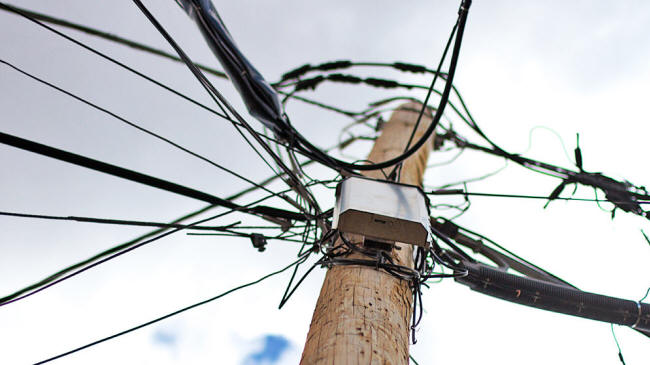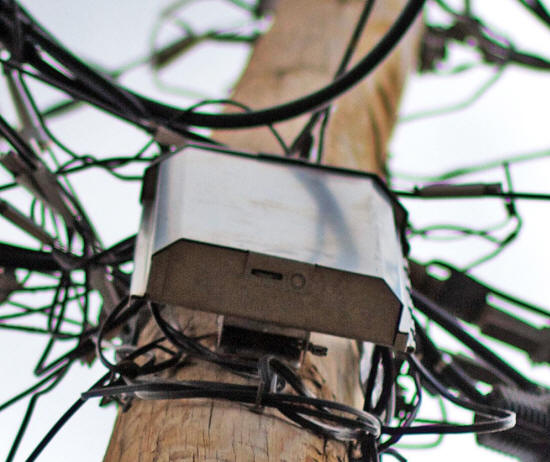|

by Joyce Nelson
November 05,
2018
from
WatershedSentinel Website
Spanish version

Photo by Alan Levine CC,
cropped from original

There's a lot of hype
about #5G, the fifth-generation
wireless technology that is being rolled out in various "5G test
beds" in major cities including,
-
Vancouver
-
Toronto
-
Ottawa
-
New York
-
Los Angeles
But it's hard to see why
we should be excited.
Proponents talk about the
facilitation of driverless vehicles and car-to-car "talk," better
Virtual Reality equipment, and, of course, "The Internet of Things"
(IoT)...
the holy grail of Big Tech that is just vague enough to sound sort
of promising.
But when it comes to specifics, there seems to be a lot of hot air
in the IoT bag.
For example, in March 2018, Canada's Innovation Minister
Navdeep Bains, while pumping $400 million into 5G test beds,
reportedly "gushed" about IoT applications, including,
"refrigerators that
monitor food levels and automatically order fresh groceries."
Then there is the 5G
proponent who enthused to CBC News (March 19, 2018) about,
"augmented reality
headsets" being replaced by "a pair of normal looking glasses,"
which everyone would be wearing in 10 years.
Those glasses would,
"automatically
recognize everyone you meet, and possibly be able to overlay
their name in your field of vision, along with a link to their
online profile."
Apparently, the future
human will be too brain-addled to make a grocery list or remember
the names of acquaintances… which may not be the image that 5G
proponents are hoping for.
"There are
thousands of published studies
that show that
even low levels of microwave radiation
do cause a
biological effect."
Amidst all the #5G hype,
it's rare to find a blunt statement like this one from
Eluxe Magazine's Jody
McCutcheon:
"Until now mobile
broadband networks have been designed to meet the needs of
people.
But 5G has been
created with machines' needs in mind, offering low-latency,
high-efficiency data transfer… We humans won't notice the
difference [in data transfer speeds], but it will permit
machines to achieve near-seamless communication.
Which in itself may
open a whole Pandora's box of trouble for us - and our planet."
Box of trouble
Many scientists would say that box of trouble has already been
opened by earlier wireless technologies, which emit
health-endangering electromagnetic radiation.
As Josh del Sol
Beaulieu, creator of the documentary
Take Back Your Power, told me by
email,
"There are literally
thousands of published studies that show that even low levels of
microwave radiation do cause a biological effect."
In fact, in March of this
year, the scientific peer review of a landmark US National
Toxicology Program study on mobile phone radiation and health found
that there is "clear evidence" that radiation from mobile phones
causes cancer - specifically, a heart tissue cancer in rats, and
"some evidence"
of cancer in the brain and adrenal
glands.
"One key player
has not been swayed
by all this
wireless-friendly research:
the insurance
industry….
'Why would we
want to do that?'
one executive
asked with a chuckle
before pointing
to more than two dozen lawsuits
outstanding
against wireless companies demanding
a total of $1.9
billion in damages."
But as Mark Hertsgaard
and Mark Dowie reported in
The Guardian (July 14, 2018),
"Not one major news
organization in the US or Europe reported this scientific news."
They attribute that
silence to the power of the Cellular Telecommunications and
Internet Association (CTIA) and the whole wireless industry,
which for decades,
"has been
orchestrating a global PR campaign aimed at misleading not only
journalists, but also consumers and policymakers about the
actual science concerning mobile phone radiation."
They have used the same
"doubt-creation" strategy used by the tobacco industry and
the oil industry:
fund friendly
research to make it seem like the scientific community is truly
divided on issues like smoking or
climate change.
But, as Hertsgaard and
Dowie note,
"One key player has
not been swayed by all this wireless-friendly research: the
insurance industry."
In their reporting for
the story, they said,
"not a single
insurance company that would sell a product-liability policy
that covered mobile phone radiation.
'Why would we want to
do that?' one executive asked with a chuckle before pointing to
more than two dozen lawsuits outstanding against wireless
companies demanding a total of $1.9 billion in damages."
Massive
experiment
Recently, 236 radiation-research scientists from around the world
have signed a petition charging that 5G will be "massively
increasing" the general population's radiation exposure.
And it's not just humans
that are endangered by this.
Dr.
Joel Moskowitz, a University of
California-Berkeley public health professor,
told the UK's Daily Mail Online
(May 29, 2018) that the deployment of 5G,
"constitutes a
massive experiment on the health of all species."
In order to facilitate
faster data-transfer speeds, 5G will utilize millimeter waves
(MMWs),
smaller waves accessed through a higher frequency of the
electromagnetic spectrum not previously used by the telecom
industry.
These smaller waves
cannot travel far, nor can they penetrate many types of materials.
So this means that there
will need to be millions of "small cell towers"
(about the size of a refrigerator) close together - within a few
feet of one another on every street.
Dr. Moskowitz warns that these millimeter waves can affect,
-
the eyes
-
the testes
-
the skin
-
the nervous
system
-
the sweat glands
Eluxe Magazine's Jody
McCutcheon states that the higher-frequency MMW bands,
"give off the same
dose of radiation as airport scanners. The effects of this
radiation on public health have yet to undergo the rigours of
long-term testing."
Adding to the dangers to
the planet, 5G infrastructure will depend on the deployment of
thousands of satellites propelled into orbit by hydrocarbon rocket
engines, contributing to atmospheric pollution.
An Oct. 27, 2016
article in The Ecologist titled "Wireless
pollution 'out of control' as corporate race for 5G gears up"
states:
"The long-term,
ecological implications of our new, anthropogenic radiation are
not known. But peer-reviewed studies revealing harm to birds,
tadpoles, trees, other plants, insects, rodents and livestock,
offer clues."
Given that he called 5G
"a massive experiment on the health of all species," I asked Dr.
Moskowitz whether the mainstream media had expressed interest in
this perspective.
He replied by email,
"Although I have been
interviewed hundreds of times by journalists since 2009 about
cell phone health effects, there has been little interest in
5G," with only three publications in the past two years showing
interest in the new technology's health effects.
The IT industry
is predicted
to account for
14% of the world’s
total carbon
emissions by 2040...
When asked why there is
such a rush to deploy 5G, Dr. Moskowitz responded that the telecom
companies in the US,
"have convinced
policymakers and the public that we are in a global race with
China and other countries to deploy this new
technology, and that we won't reap the economic benefits unless
we are the first to deploy."
As well, the industry
claims that we need 5G for the Internet of Things and to,
"improve broadband
internet access in rural areas," although such claims are
"arguable."
Josh del Sol Beaulieu
told me that the rush into 5G is because of,
"corporate profit -
'tens of billions of dollars of economic activity' as stated
very clearly by former FCC [US Federal Communications
Commission] frontman
Tom Wheeler in 2016."
Beaulieu refers to the
fact that surveillance is becoming big business.
"If the data
harvested unlawfully from 'smart' meters will be worth much more
than residential electricity, than what will the unparalleled
amount of 'user data' harvested by ultra-invasive 5G technology
be worth?"
Beaulieu also mentions
the fact that 5G,
"emits the same
frequencies that are used in crowd control weapons"
developed by the Pentagon.
Gadgets &
climate change
People are becoming aware of the "dirty" side to their gadgets:
More recently, the
connection to climate change has
been revealed.
As tech site Gizmodo has
explained,
"The Internet works
because every network is connected, somehow, to every other.
Where do those
connections physically happen? More than anywhere else in
America, the answer is 'Ashburn' [Virginia]."
This location is one of
many data-hubs in that state where, as
US News put it,
"Twenty-four hours a
day, seven days a week, hundreds of thousands of servers here
rapidly transmit E-mails, process Internet search queries,
safeguard classified data, handle online financial transactions,
and store videos and medical records.
And suck up
megawatts."
Calling these massive
data servers "energy hogs," U.S. News noted that they're located in
Virginia because that state has,
"the country's
cheapest electricity rates."
Indeed, The Guardian
reported (July 17, 2018) that,
"70% of the world's
online traffic" is routed through just one county in Virginia,
with such server farms "set to soon have a bigger carbon
footprint than the entire aviation industry."
The article points out
the IT industry is predicted to account for 14% of the world's total
carbon emissions by 2040, with the Internet of Things adding greatly
to that number.
But now the push is on in the US for these energy hogs to use "clean
energy." (Is that why the Trudeau Liberal government is planning to
build 118 hydroelectric dams in the coming years?)
Beaulieu suggests we educate our city councilors to resist the 5G
build-out.
Others recommend staying
wired, and refusing to buy any "smart" appliances. With the Canadian
government poised to auction off more of the electromagnetic
spectrum to the telecom industry, we can also remember that the
spectrum is part of the Commons.
We should all have a say
in this...
|



